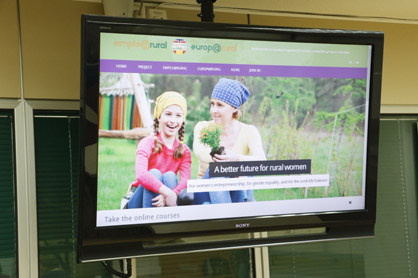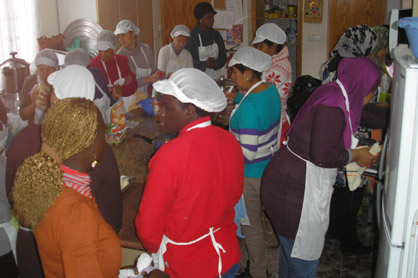Female employment to end social exclusion
 Ending social exclusion lies in socio-labour inclusion. Having in mind this idea, 25 projects have been developed, with EEA Grants funding, in order to encourage the labour and social inclusion of women belonging to vulnerable groups, with very encouraging results.
Ending social exclusion lies in socio-labour inclusion. Having in mind this idea, 25 projects have been developed, with EEA Grants funding, in order to encourage the labour and social inclusion of women belonging to vulnerable groups, with very encouraging results.
16.02.2016
The best social policy is employment, according to the experts. For that reason, encouraging the labour and social inclusion of vulnerable women (victims of gender-based violence, immigrants, Roma women, rural areas…) has been one of the objectives of the Gender Equality and Work-Life Balance Programme, managed by the Secretary of State for Social Services and Equality and funded with 10 million from the EEA Grants.
Under this specific chapter, 25 projects have been developed, including more than 270 training activities in which more than 3,760 women have taken part, thanks to the 1.145 million euros provided by the European Economic Area Financial Mechanism. The main conclusion is that the best way to achieve the labour inclusion of these women facing the risk of exclusion is the personalized itineraries of training.
The projects have tried to cover the largest possible number of groups of vulnerable women. In particular, there have been initiatives addressing immigrants, single mothers, victims of gender based violence, Roma women, prisoners and women with disabilities, especially training for employment, training in new technologies and entrepreneurship support.
 Thanks to one of these projects, developed by Fundación Madrina, around 100 single mothers in risk of exclusion have found a job, following the training received and the support. Besides, the project promoter has added 15 ‘godmothers’ and 24 mentors so they can continue their work with this vulnerable group. Or the Spanish Cáritas project, which has achieved to improve the professional and personal skills of around 600 women unemployed and with family responsibilities.
Thanks to one of these projects, developed by Fundación Madrina, around 100 single mothers in risk of exclusion have found a job, following the training received and the support. Besides, the project promoter has added 15 ‘godmothers’ and 24 mentors so they can continue their work with this vulnerable group. Or the Spanish Cáritas project, which has achieved to improve the professional and personal skills of around 600 women unemployed and with family responsibilities.
Seven out of these 25 projects have addressed women in rural areas. Such as the one developed by the Federation of Rural Women Associations (Fademur) which has trained and advised 230 women in order to find a job, collaborating and sharing best practices with the Norwegian entity Oslo Krisesenter, donor project partner. An organic egg farm, a rural tourism company or a soap making business are some of the projects that these women are already developing.
“The objective of helping these women to find a job is much more ambitious. Gender equality is the main output, but we also empower rural women, we fight against gender-based violence and we contribute to rural economy strengthening”, explains Fademur.